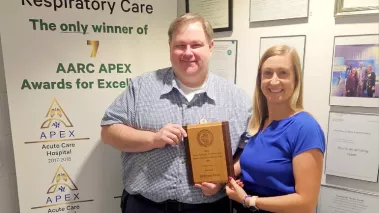Gustavo Morfin Valencia isn’t looking for a better product to treat diaper rash. He just wants a superior plan.
Valencia, a Doctor of Nursing Practice student in Rush University College of Nursing’s Neonatal Nurse Practitioner program, is honing his skills so he can become a leader in providing health care to the most vulnerable infant patients. That includes keeping them as comfortable as possible, partly by finding the best process for treating diaper rash.
He recently talked about his diaper dermatitis project, his upbringing and what inspired him to become a nurse practitioner.
Tell us about your background.
Gustavo Morfin Valencia: I grew up in Southern California and attended the University of California, Merced, where I received a bachelor’s degree in psychology with a minor in sociology. At that time, I thought I would do clinical psychology in a hospital setting.
But during my last semester, I had an opportunity to speak with a psychiatric nurse practitioner. She talked about her role in the hospital, and that seemed to really align with what I wanted to do, so that’s when I started looking into nursing and what nurse practitioners do.
From there, I did some prerequisite course work to get into nursing school. I got into an accelerated bachelor’s degree program at Purdue University Northwest. That’s where I received my Bachelor of Science in Nursing before applying to Rush’s DNP program.
What else motivated you to purse nursing?
GMV: At first, I really didn't know what I wanted to do in the health care world. Nobody in my family was in health care. There were in business and other fields.
At one point, I had the opportunity to shadow nurses, volunteer in the ER and be around nurses and doctors. I saw the patients’ experience up close. I saw how important the nurse’s role is. Seeing that patient-nurse interaction from the health care side was a new perspective for me.
I’d see the demeanor of the patients change for the better. They’re probably scared to be in the ER, and I saw nurses help ease their fears. That really opened my eyes to the fact that nursing is more than just providing health care for patients. You’re also there for the patient emotionally. More than anything, that really sparked my interest in nursing.
Why did you choose neonatal nursing specifically?
GMV: When I did my pediatric clinical rotation, I had a chance to work at a local children’s hospital. I got to see a lot of kids who had been discharged from the neonatal intensive care unit but were not quite ready to go home yet.
I just knew that was the specialty I really wanted to go into. I knew it wasn't as easy to get into that area — such a specialized field right out of nursing school — but I was lucky enough to get into a nursing residency program, which is how I started my neonatal nursing career.
Why did you choose Rush to continue your education?
GMV: Besides its outstanding reputation and great passing rates for boards, what really sealed the deal for me was when I got to do my in-person interview. I got to meet with Karen Wright, the director of the program. After meeting with her, going through the whole interview process and meeting with other faculty that day, it felt like I would be really supported in the program They weren’t just going through the motions.
It made a world of difference to me. Everyone was very welcoming.
What has your experience at Rush been like?
GMV: It's been great so far. I’ve always felt supported by faculty and all the staff. Everyone is always so readily available to help. The program is run so smoothly.
I have colleagues at other schools who have expressed frustration with their program. I've never experienced that at the College of Nursing. I've never felt like I've been on my own. There are so many resources, from the library to faculty who are there for you. Everything has been great.
Do you have any exciting projects you're working on?
I'm about to start implementing my DNP project, which focuses on diaper dermatitis in the NICU. I’ll be implementing that at Rush’s NICU. It’s based on an algorithm I’m developing for nursing staff to follow. My hope is it will improve the treatment of diaper dermatitis for infants in the NICU.
My algorithm goes into more detail than usual about what nursing staff should do, and how long and how to escalate the care if needed. Really, what I’m doing taking the treatment plans we already have, breaking them down into a more detailed process and including visual directions that nurses can reference.
Diaper rash seems like something that’s so simple, but it really creates discomfort for infants who are already in a vulnerable state. Hopefully we can improve the way we treat that discomfort and pass the information along to parents, who can continue that at home when the infant is discharged.
And you’ve been helping at the COVID-19 vaccine clinic at Rush?
GMV: Yes. In fact, last winter I gave a shot to Christine Kennedy, dean of the College of Nursing. I didn’t recognize her at first. We started talking, and she mentioned she was on the nursing staff here. She asked about my program and how I liked it. She ended up telling me who she was. It was a neat experience.
How would you like your career to play out after graduating?
Ideally, I would love to transition from being a nurse to a neonatal nurse practitioner at Rush in the acute care unit. That would be my goal. I would like to be at a large teaching hospital. I’ve loved working in a large academic setting, where you have all the resources you need and work with an interdisciplinary team.
I would also like to teach eventually. I have had nothing but great instructors and faculty at the College of Nursing, so I would like to carry that on.
What advice would you give to someone who might be following a similar path?
GMV: I would tell them to just go for it and try whatever it is you want to achieve. Just try it and don’t compare your path to others, because it will be different for everyone. You might not start out in the specialty you really want, but it does not mean you can't eventually get there.







